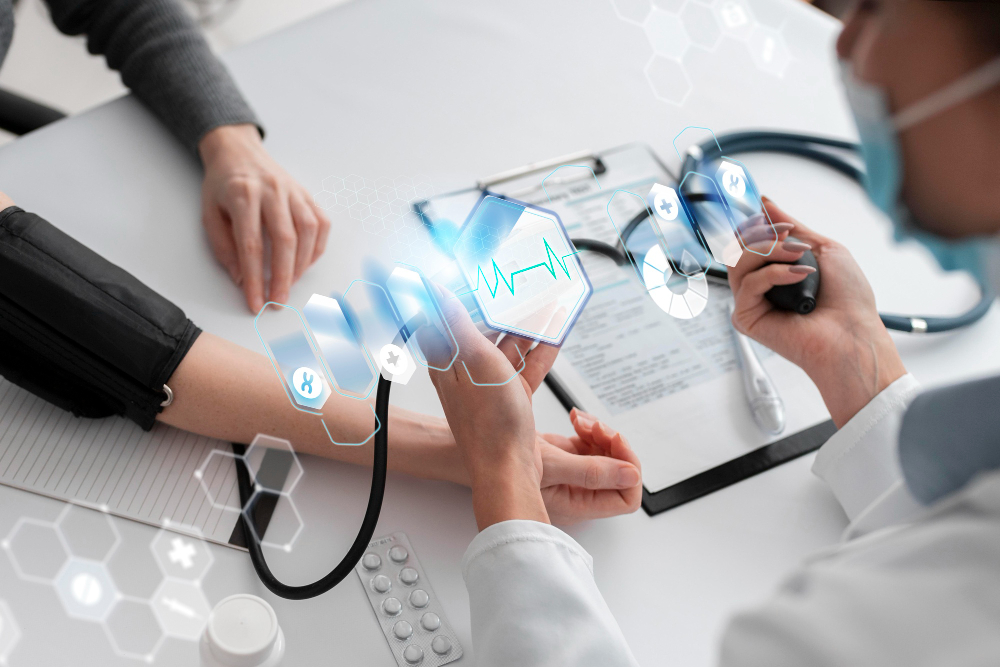- 1.1 Automation Of Labor-Intensive Tasks
- 1.2 How Is AI Helpful?
- 1.3 Revolutionizing Healthcare With AI
- 1.4 Example of How AI Can Help
- 1.5 The Appeal of AI
- 1.6 Impact On Medical Diagnoses
- 1.7 Obstacles
- 1.8 Processing of Data
A few years ago, combining healthcare and AI was only seen in science fiction books. But now, AI has become a reality. And more people are interested in how it can change healthcare for the better. AI has gone from a theoretical concept to a practical solution. Moreover, a person living in a third-world country now has the opportunity to get access to advanced medical information or medication records. And that is because of medical records translation services.
Artificial intelligence (AI) is changing healthcare, and we already see its effects.
There are three main ways AI is affecting the healthcare industry.
Automation Of Labor-Intensive Tasks
Using AI to handle labour-intensive tasks is helping healthcare workers save time. And focus on what’s important – taking care of patients. AI technology can handle repetitive tasks and administrative work independently, freeing doctors and nurses to spend more time with patients. Moreover, AI can help identify and fix inefficiencies in current healthcare practices. Some of the best medical translation services around the world have utilized AI in their work processes as it helps decrease manual labour.
How Is AI Helpful?
AI can do some tasks better than humans, like chatbots and reminders. One example is the software from Olive AI called “Autonomous Revenue Cycle.” It checks if insurance is valid and finds the benefits. And makes the claims correctly. Another example is the “Perioperative Solution” from Qventus. It uses AI and machine learning to fix problems with scheduling surgeries in operating rooms. It allows health systems to do more surgeries and make more money each month. Medical language translation services enable doctors to help their patients who do not speak their language.
Revolutionizing Healthcare With AI
AI holds the potential to transform healthcare, and virtual patient care is just one aspect of it. Despite the challenges of providing 24/7 care to each patient, AI-powered virtual care solutions can help address this issue. It uses AI to notify healthcare providers when intervention is necessary. And to monitor the impact of patient behavior toward improved health outcomes. This is evidenced by a 2022 UPenn study that applied AI to review inpatient and outpatient notes of nearly 2 million patients and revealed that about half of them were duplicates from previous records, thereby casting doubts on the accuracy of the medical records.
Example of How AI Can Help
Wearable technology from VirtuSense utilizes AI to improve patient well-being and reduce the risk of injury. VSTAlert decreases falls in skilled nursing facilities by 75% and 78% in hospital settings. VSTBalance detects gait and mobility deficiencies, increasing resident mobility in assisted living communities by up to 85%. Biofourmis uses AI, analytics, and wearables to monitor complex chronic conditions remotely. Care.ai’s facility automation platform uses AI to monitor in-facility patients for falls, injuries, and protocol adherence.
The Appeal of AI
The appeal of AI in healthcare lies in its ability to achieve better results than humans in many cases. This is a thrilling aspect of AI’s development and its potential to perform tasks that humans can’t. However, professional medical interpretation services have integrated AI into their systems so that they can produce better results and offer patients world-class medical assistance.
Impact On Medical Diagnoses
AI is making a significant impact on medical diagnoses despite still being in its early stages in healthcare. Viz.ai’s AI software detects early signs of large vessel occlusion strokes by cross-referencing CT images with its database. Furthermore, the Mayo Clinic’s AI-assisted screening tool identifies people at risk of heart dysfunction 93% of the time, compared to 85% accuracy for mammograms. Digital Diagnostics utilizes AI for detecting diabetic retinopathy and skin cancer.
Additionally, a study in Nature found that a trained neural network classifies hip fractures 19% more accurately than experienced human observers. This could improve treatment, better patient outcomes, and reduce costs.
On the other hand, electronic medical interpretation has allowed medical institutions to offer their aid to patients worldwide. Moreover, they allow interpretation in multiple languages, which caters to a large audience.
Obstacles
AI may face obstacles, including cost and the need for proof of effectiveness, but the greatest challenge lies in the lag of acculturation among healthcare executives. A study by Capgemini shows that executives in pharma, med techs, and hospitals need to catch up and understand that AI is not just a future trend but a current reality. To lead in its development, healthcare executives must take an active role in embracing and promoting AI’s use in healthcare.
Processing of Data
AI’s ability to analyze and access data from various sources and make an accurate diagnosis will benefit medical professionals and patients. Moreover, medical language interpretation services have utilized the ability of AI’s processing power.
Artificial Intelligence technology can combine data from multiple sources, including the patient’s Electronic Health Records (EHR) and genetics, to give caregivers more prompt recommendations and alerts.
AI tools can blend symptoms listed in the EHR, like nausea or persistent bloating, with information about the DNA variant to inform the physician of an increased risk of developing Celiac Disease. AI algorithms draw data from various sources, including medical records, labs, and genetic tests, to give you timely and customized outputs.
Conclusion
In this article, we have discussed how AI has affected the healthcare industry. With impressive advancements in technology, AI has immensely reduced human errors and has increased the efficiency of various organizations that offer professional translations of IFUs.
The key takeaway from this passage is to realize that AI is here to stay. Furthermore, it will significantly affect the way healthcare is done in the future.
